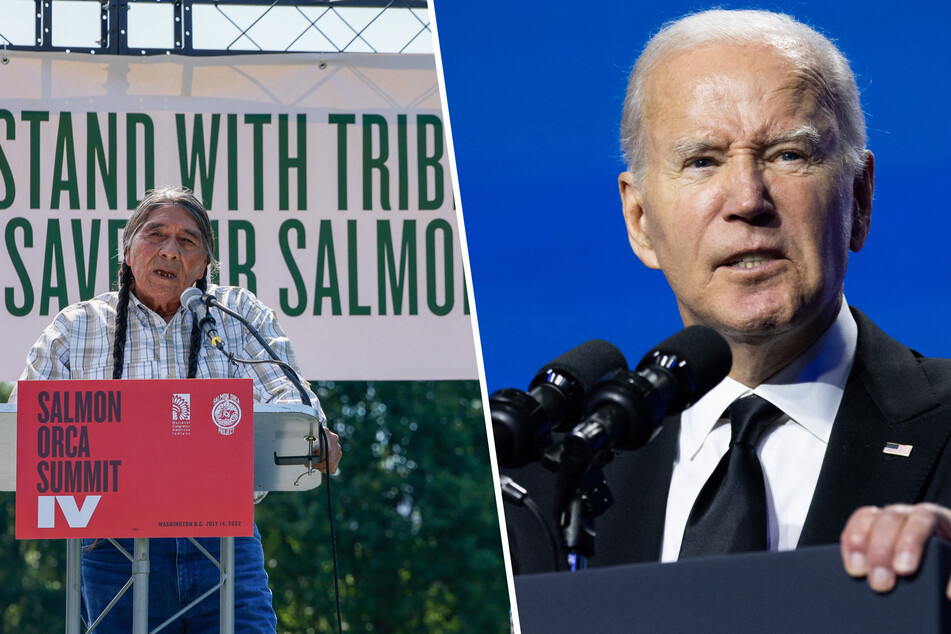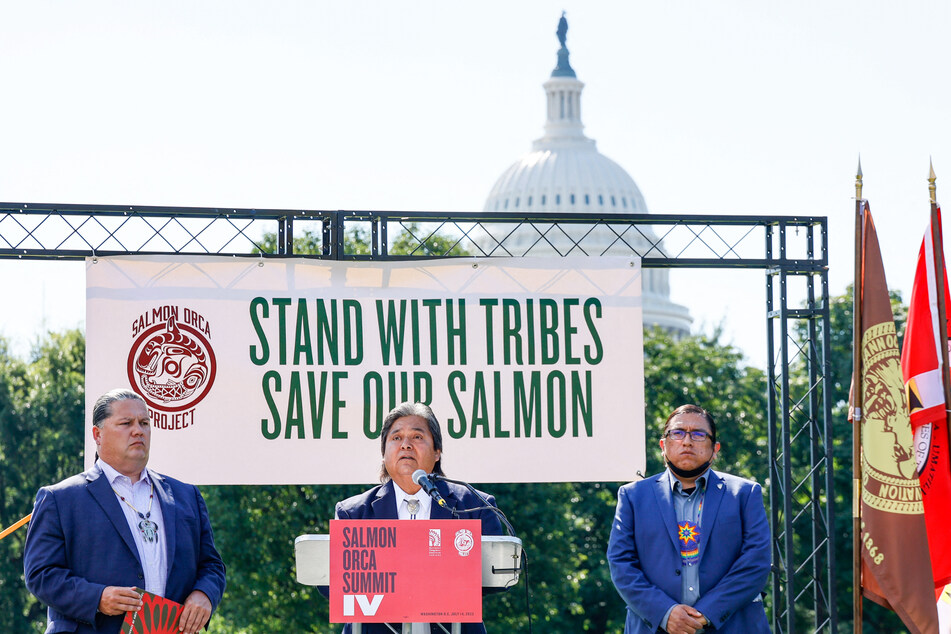Biden pledges millions for salmon recovery in deal with Indigenous tribes
Seattle, Washington - On Thursday, the Biden administration committed more than $200 million toward salmon recovery in the Upper Columbia Basin in return for a 20-year stay of litigation.

The Confederated Tribes of the Colville Reservation, the Coeur d'Alene Tribe and Spokane Tribe of Indians signed the agreement with federal officials in a ceremony Thursday.
The agreement secures $200 million from the Bonneville Power Administration to be paid over 20 years to advance a tribally led implementation plan to restore salmon and steelhead in the Upper Columbia Basin.
The construction of large hydroelectric and flood control dams — including the Grand Coulee Dam and Chief Joseph Dam, built 50 miles downstream — blocked anadromous fish from migrating into the Upper Columbia River Basin and onto or through the ceded and reserved lands of the Colville, Spokane, and Coeur d'Alene tribes.
Tribes lost access to salmon and steelhead in the blocked areas, an irreparable harm devastating to tribal cultures and mental, spiritual, and physical health, tribal leaders said in a prepared statement, wrongs that can only be healed by restoring salmon to their home waters.
Salmon runs in the Upper Columbia were abundant for thousands of years and a mainstay of tribal cultures and trade. The fishery at Kettle Falls on the Upper Columbia, which was flooded by the Grand Coulee Dam, was second only to the abundance at Celilo Falls on the mainstem Columbia, which was drowned by the Dalles Dam.
In a ceremony in Washington, D.C., federal officials committed to working with the tribes toward fishery restoration under a process still in the planning phases.
Upper Columbia United Tribes celebrate salmon reintroduction plan

For more than a decade, the Upper Columbia United Tribes, which includes tribes in Washington and Idaho, have been working toward a phased plan to study the feasibility and implementation of reintroducing salmon and steelhead back to the waters now blocked by dams.
The four-part effort is currently in the second stage, which includes research over the next 20 years to establish sources of donor and brood salmon stocks for reintroduction, test biological assumptions, develop interim hatchery and passage facilities, and evaluate how the program is working.
For tribes, the commitments Thursday are a long time coming.
"In 1940, Tribes from around the Northwest gathered at Kettle Falls for a Ceremony of Tears to mourn the loss of salmon at their ancestral fishing grounds," said Jarred-Michael Erickson, chairman of the Confederated Tribes of the Colville Reservation, in a prepared statement from the White House Council on Environmental Quality. "The federal government is taking a major step toward righting that historic wrong ... The Colville Tribes (look) forward to our children celebrating a Ceremony of Joy when salmon are permanently restored to their ancestral waters."
Jaime Pinkham, who is Nez Perce, is principal deputy assistant secretary of the Army for Civil Works. He joined with other federal officials in celebrating the agreement. "The Army is excited to announce this partnership with Tribes in the Upper Columbia River Basin to collaborate and support their significant efforts in planning and studying the reintroduction of salmon to the region," Pinkham said.
In addition to the money from BPA, which comes from its ratepayers around the region, the US Bureau of Reclamation is also committing $8 million in federal funds toward the juvenile salmon outmigration studies, genetic sampling, and development of fish passage designs.
Salmon recovery plan provides environmentally-friendly solution
The agreement was celebrated not only by tribes and agencies but also by Northwest RiverPartners, which represents users of the Columbia and Lower Snake Rivers, including barge operators and utilities. The group has staunchly opposed dam removal on the Lower Snake for salmon recovery. But it supports this recovery effort that leaves dams intact.
"Taking this next step in studying salmon reintroduction above these blocked areas is the right thing to do and lays the foundation for the possibility of sustainable salmon runs in the upper Columbia River Basin," executive director Kurt Miller said in a prepared statement. "Reintroduction has the potential to create hundreds of miles of upstream habitat for salmon, responds to important Tribal commitments, and does so without negatively impacting the hydropower our region relies on for carbon-free, affordable energy."
Hydropower is not actually carbon-free because reservoirs belch methane, a greenhouse gas that includes carbon. However, hydropower, using water for fuel, is cleaner energy than any fossil-fuel alternative.
Cover photo: Collage: Jemal Countess / GETTY IMAGES NORTH AMERICA / Getty Images via AFP & SAUL LOEB / AFP